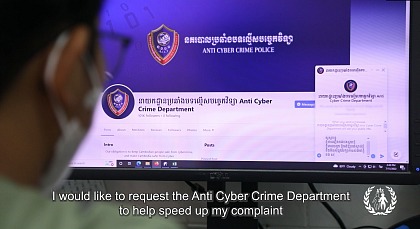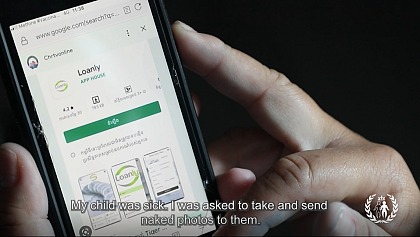Daring to Speak Out: Online Loans & Illegal Extortion
Published on 1 August 2022Online money lending networks are targeting Cambodian women on Facebook and Telegram, trapping them into growing debts and extorting them using naked photographs and videos. Social media companies and Cambodian authorities are failing to act, allowing these predatory groups to exploit women with impunity.
In the last year, LICADHO has provided services to three women who have been harassed by informal online lenders. Each with similar experiences, the women first borrowed sums as small as $50 to pay for daily expenses or medical care from groups advertising on Facebook, but ended up being blackmailed and extorted after sending naked photographs and videos in an attempt to escape the cycle of debt.
How it Begins
After receiving small initial loans, the women faced high interest rates and unclear loan conditions, which led to growing debt burdens. Then, new lenders began contacting the women on Telegram to offer further loans. The groups also began to relentlessly contact their friends and family to pressure repayments.
As the pressure reached a tipping point, a new group identified as Loanly offered each woman a loan large enough to repay their smaller debts – but first required the women to send naked photographs or video of themselves via Telegram, along with their location and identity documents.
Feeling trapped and harassed by the other lenders, the women agreed and downloaded Loanly’s application which granted the group access to their phone contacts. Each woman received hundreds of dollars less than promised via eMoney, with the Loanly group claiming the rest was deducted as fees.
Campaign of Harassment
Loanly launched a ruthless campaign of harassment to pressure payments. The group threatened to release the naked photographs and video online; claimed they were nearby the women’s houses; relentlessly called them, their families, friends and colleagues from numerous phone numbers; publicly posted photographs of their families on Facebook, accusing them of being cheats and liars; added them to Telegram groups where other women’s naked photographs were already being shared; and, in one case, began distributing naked photographs of the woman in a Telegram group.
The women report significant impacts of the repeated threats, including suicidal thoughts, depression, anxiety and fear for their jobs, marriages or the safety of their children.
Loanly refused to provide clear information to the women about the total amount they owed, and making payments only provided a few days of relief before the harassment began again. For Sokhoeun*, a woman who has faced extensive harassment, even making payments exceeding double the sum she received failed to help. She borrowed $1,000 from Loanly, received less than $600 after undefined fees and then paid the group almost $1,400, yet the harassment continued.
I would like to request the Anti-Cyber Crime Department to help speed up my complaint and other victims’ complaints
No Accountability
Extortion and blackmail are illegal under Cambodia’s Criminal Code and the three women have filed official complaints, providing extensive evidence. The Ministry of Interior’s Anti-Cyber Crime Department has not held anyone to account to date. While the Loanly application no longer appears to be available, online loan groups continue to similarly target and harass Cambodians on Facebook and Telegram.
“I would like to request the Anti-Cyber Crime Department to help speed up my complaint and other victims’ complaints,” said Bopha*, another woman who has been harassed by online lenders.
Compiling Abuses, Time for Justice
These targeted attacks are gender-based violence. They exploit gendered expectations of women and cause psychological and economic harm. “For women it is indescribable,” said Bopha, discussing the double standards men and women face. “Men can restore their dignity, but for women it is really difficult to restore.” Bopha and Sokhoeun are now speaking out and encouraging others with similar experiences to do the same.
Exploitative online lenders thrive in an environment where basic services such as healthcare and education carry large, informal fees and costs. Cambodia is one of the most over-indebted countries in the world. Private debt levels soared to 174% of the country’s GDP as of March 2022, and debts have driven coerced land sales, unsafe migration and other human rights abuses. Until the Cambodian government properly regulates formal and informal lending and provides truly accessible basic social services, predatory lending will continue to flourish in Cambodia.
Last year, LICADHO called on social media companies and the Cambodian government to take steps to end online human rights abuses. We renew those calls, and request the Ministry of Interior’s Anti Cyber Crime Department conduct swift and thorough investigations to ensure justice in accordance with Cambodian law. We further call on Facebook and Telegram to stop their platforms from being used as sites of gender-based violence and criminal activity in Cambodia.
If you have experienced online harassment, you can seek support by contacting an organisation such as LICADHO. All services from LICADHO are free of charge.
* Names changed to protect privacy
MP3 format: Listen to audio version in Khmer










